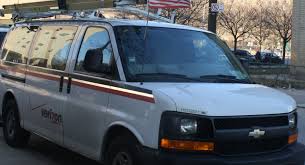
By Zolan Kanno-Youngs, Wall Street Journal,March 13, 2017
New York City filed a lawsuit Monday against Verizon Communications Inc., alleging the company failed to deliver a 2008 promise to offer fiber-optic cable connections to every home in the city.
The breach-of-contract suit is the latest step in what has been a year of tension between the city and the company.
Last summer, the city's Department of Information Technology & Telecommunications released an audit examining a franchise agreement that Verizon signed with the city in 2008. The agreement permitted Verizon to deploy its fiber-optic network, Fios, as long as it ran its fiber network past all city dwellings by 2014.
The deal technically only covers cable TV, but Verizon also offers high-speed internet over the same fiber-optic cables.
The audit found more than 40,000 requests for service pending, most of which had been outstanding for 12 months or longer. Last September, the city notified Verizon the company was in default of an agreement to roll out the cable network-the first step in the legal process.
New York City First Deputy Mayor Anthony Shorris said after extended talks, it became clear the company wasn't going to complete the rollout.
"Whether it's profitable or less profitable than they thought, for them it's an obligation they have to New Yorkers and we won't let them break their promise," Mr. Shorris said.
Verizon spokesman Raymond McConville said the company was aware of the city's suit and denied the allegations.
Mr. McConville said the company has fulfilled its end of the agreement because every dwelling in the city is within reach of the cable network. Many homes don't have access to the service because Verizon has struggled to get access from landlords, he said.
Verizon has invested $3.7 billion to rollout the cable network in the city and proposed investing nearly another billion over the next four years to extend the service to remaining residents.
"The city is inexplicably turning its back on this investment and its residents by pursuing foolish litigation that will harm jobs, business growth and technology competition throughout all five boroughs," Mr. McConville said.
He said Mayor Bill de Blasio's administration "is acting in its own political self-interests that are completely at odds with what's best for New Yorkers."
In addition to its failure to deliver the promised fiber network, the city said Verizon also failed to respond to service requests within six- to 12-month time frames, and didn't cooperate with the city's audit.
City officials hoped in 2008 the Fios network would provide competition in the city. Where the network isn't available, residents usually have access to just one cable provider.
The city sampled 52,000 addresses for Fios availability last year and found the outer boroughs were more likely to have access than Manhattan. About two-thirds of public-housing developments, home to more than 400,000 people, also didn't have access.
City officials said 57% of New Yorkers currently have access to the cable network. A spokesman for Verizon confirmed the number.
"Verizon must face the consequences for breaking the trust of 8.5 million New Yorkers," Mr. de Blasio said in a statement. "Verizon promised that every household in the city would have access to its fiber-optic FiOS service by 2014. It's 2017 and we're done waiting."
